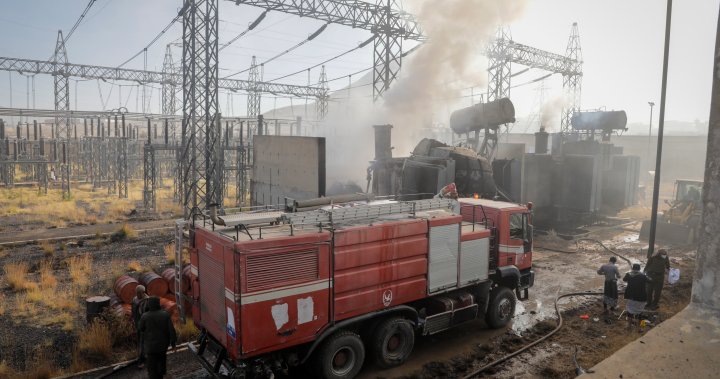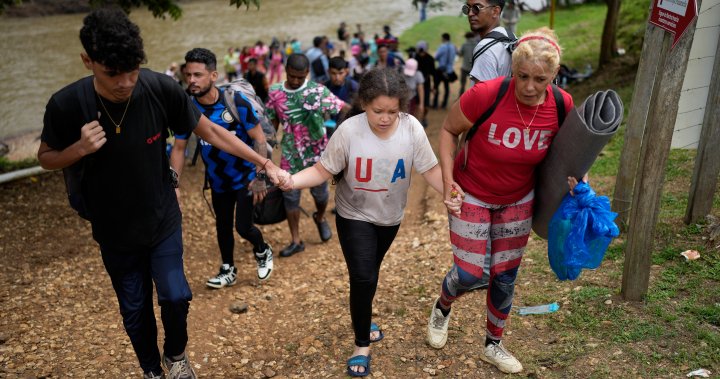Guatemala is open to receiving citizens of other Central American countries deported from the United States, three sources familiar with the matter said, as the country looks to build a positive relationship with the incoming Trump administration.
“There must be a regional response,” a Guatemalan official, who requested anonymity, told Reuters. “And we want to be part of the solution.”
The United States is struggling to deport its citizens from places such as Nicaragua, Venezuela and Haiti due to strained relations. This may pose a challenge to the president-elect Donald Trumpwho pledged to do so Record numbers for deportation Of immigrants living in the United States illegally.
His team has already reached out to the governments of several countries to test their readiness to receive deportees from third countries.
Many of the United States’ neighbors, Including Mexico The Bahamas said they did not want to receive deportees from third countries.
Story continues below ad
In 2022, more than 40 percent of immigrants living in the United States illegally came from Mexico, amounting to 4.8 million out of 11 million overall, according to the US Department of Homeland Security report. It was followed by Guatemala, El Salvador and Honduras, which together accounted for more than a fifth of the total.
Guatemala was particularly proactive in preparing for Trump’s second term compared to its neighbors El Salvador and Honduras, meeting with members of Trump’s transition team, Senator Marco Rubio before his appointment as secretary of state, and the conservative Heritage Foundation, about immigration and communities. Deportations, border security, drug smuggling, and China.
The three countries, along with the Nicaraguan government, which has an openly hostile relationship with the United States, face a moment of reckoning, both in dealing with Trump’s request to accept deportees and in the potential reduction in remittances from migrants in the United States, which pose a real threat. A major contributor to their economies.
Trump’s transition team did not immediately respond to a request for comment.
The meetings between Guatemala and the United States suggest that the center-left government of President Bernard Arevalo, an ally of the Biden administration, wants to start on smooth terms with the Trump administration, despite ties between Guatemala’s conservative opposition and many people in the president-elect’s orbit. Trump is scheduled to be inaugurated on January 20.
Story continues below ad
El Salvador, whose populist president Nayib Bukele already enjoys comfortable relations with the Trump camp, has taken a less proactive approach. But a source close to the discussions between Salvadoran officials and the transition team said the Trump administration expects smooth cooperation with El Salvador on immigration.

Get daily national news
Get the day’s top political, economic and current affairs news, headlines, delivered to your inbox once a day.
The Guatemalan official noted that the country is already receiving 14 deportation flights per week under President Joe Biden and is preparing for an increase.
Honduran Deputy Foreign Minister Antonio Garcia told Reuters that the country receives ten deportation flights weekly. Reuters was unable to confirm the number of deportation flights to other countries in Central America.
Guatemala expects a significant increase in deportations in the fall, based on the logic that it will take time to intensify.
“We are not prepared for this, but we know it is coming,” said a second Guatemalan government official.
Story continues below ad
The second official said Guatemala would prioritize Guatemalan citizens for reintegration, adding that each country must bear its responsibility towards its citizens, but also highlighted a regional agreement between Honduras, Guatemala, Nicaragua and El Salvador that allows freedom of movement.
The source said that Guatemala’s vision for the deportees is to use the skills they acquired in the United States to work in the private sector.
“These are people who have worked in construction, in the service industry, in various sectors, and many of them speak English. We want to exploit that.”
Trending now
-
![]()
Hollywood stars support Blake Lively amid allegations against Justin Baldoni
-
![]()
Reports: A Canadian was killed in a boat explosion in Florida
In late November, Guatemala’s security minister and immigration director traveled to Washington, according to the three sources close to the matter, and met with Rubio and other key Republicans, where discussions covered drug trafficking, immigration and deportation.
They also met with the Heritage Foundation, whose staff worked for much of the first Trump administration.
While they discussed immigration and deportations, the foundation mainly emphasized that it wanted Guatemala to maintain its loyalty to Taiwan, a US ally, with regard to China, the sources said.
Officials know that further deportations could strain Guatemala’s economy if remittances decline and the cost of reintegrating deportees rises.
About 20% of Guatemala’s GDP comes from remittances — money expatriates in the United States send home.
Story continues below ad

Will Trump’s promise of mass deportation lead to the separation of families?
In 2023, remittances accounted for 24% of El Salvador’s GDP and about 30% of Honduras’ GDP.
Guatemalan officials said they were not concerned about the direct economic impacts of the decline in remittances, but expressed concern about the decline in remittances coupled with Trump’s proposed tariff hikes or taxes on remittances.
The second official said: “We don’t have a financial plan yet. There are a lot of unknowns.”
Guatemalan officials are analyzing surveys conducted by the United Nations International Organization for Migration, which shows which parts of Guatemala the most migrants have left, in hopes of preparing those communities for their possible return, two officials said.
The Salvadoran government said it would announce its plans once the Trump administration takes action.
Vice President Felix Ulloa told Reuters, “We are working based on facts and it is all still just speculation.”
Story continues below ad
Bukele, like Trump, portrays himself as a political obstructionist, and has relationships with several people close to Trump.
Honduran Deputy Foreign Minister Garcia said the country’s ambassador to the United States met informally with Trump’s transition team and with Guatemala to coordinate the response.
Garcia stressed that the country has always received deportees, but noted that at least 40% of migrants are trying to immigrate to the United States again. He added that it is important for both countries to work to improve the living conditions that cause migration, such as gang violence, unemployment and poverty.
“Honduras is already experiencing mass deportations and the difference may be from 10 flights to 20 or 30 more,” Garcia said. He added: “We will have to sit down with the Americans and agree on logistics and available places in the return centers to do this in a framework of dignity and respect.”


















